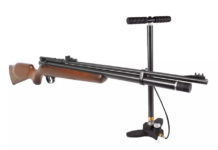Fish are not the only thing that can be caught underwater. A different kind of fishing is grabbing the attention of people around the world. It’s called magnet fishing. Instead of casting out a lure to catch fish, you cast out a magnet to catch treasure. At least, that is the goal. It might seem like a harmless pass time and a great way to spend a day on the water, but I decided to do some research to find out if magnet fishing is actually legal.
Is magnet fishing legal? There are not yet any specific laws regarding magnet fishing that I could find. However, be aware of trespassing laws when accessing private property. Other legal issues may arise if the act of magnet fishing poses a risk to people around you. If you happen to find a discarded gun, contact authorities to avoid violations of local or federal laws.
Serious problems are unlikely to occur, but using some common sense can help keep you out of trouble. Now let’s go over some of the important questions to ask before you start magnet fishing.
How does magnet fishing work
Magnet fishing is really quite simple. A powerful magnet is attached to a rope or even tied to a rod and reel with hi-strength fishing line and tossed out into a lake, river or other bodies of water. The magnet is then dragged along the bottom while being retrieved in the hopes of attracting ferrous metal objects.
Anything that contains magnetic material is fair game. You never know what you may pull out of the water and that mystery is what makes this sport so addictive.
Keep in mind that once you pull something out of the water, you should keep it and properly recycle or dispose of any unwanted items at home. Throwing anything back in the water is considered littering.
What type of magnets work best
Rare-earth magnets, like neodymium, are some of the strongest magnets for their size. To attach a rope, use a neodymium magnet with an eyelet or hole.
Magnet pull force is measured in kilograms or pounds. It takes a powerful magnets to pull up large and heavy objects. At a minimum, select a magnet with a 150 pound pull force. These work well for smaller objects like knives, tools and lost fishing tackle.
Super strong magnets are dangerous and will cause injury when used improperly. Always exercise caution when you are around large metal objects and electronics.
Best places to go magnet fishing
Not all bodies of water are created equal. Magnet fishing is a game of patience and perseverance, but a little research before picking a spot can increase your odds of success.
Heavily visited urban lakes, ponds and rivers are great spots to try your luck. Years of use leads to an accumulation of all sorts of material. Local swimming holes are ideal for finding small treasures.
Also, look for places that have historical significance when you want to find old relics and artifacts from by-gone eras. City canals and ditches have been known to produce some interesting finds.
Keep in mind that as magnet fishing gains in popularity, you may not be the only one fishing. Try finding unusual or hard to reach spots.
Do you need a license to magnet fish
Unlike actual fishing, magnet fishing does not require a license as of this writing. It is always a good idea to check with your state wildlife agency to see if they have any new regulations that may affect the legality of magnet fishing. You can visit our Fish and Wildlife by State page to investigate your state’s regulations.
Is magnet fishing dangerous
It is possible to cause dangerous situations that can jeopardize the safety of yourself and others. A strong magnet attached to a rope represents a serious hazard to boaters, especially if you are fishing from a bridge in high boat traffic areas. Obey signs that prohibit fishing. You may not be trying to catch fish, but dangling a powerful magnet from a rope to catch large metal objects is still fishing.
Protecting yourself from harm is important too. Anytime you are around water with a risk of falling in, wear a life jacket. The magnet itself is also dangerous. Your hands and fingers can be pinched or crushed if you get between the magnet and a large metal object like a bridge beam.
If ever you get a magnet permanently stuck or snagged on the bottom, do your best to remove or sink the rope. A coil of floating rope can easily damage a boat motor if run over. Be responsible and avoid leaving a mess.
Like any sport, risk is certainly a part of magnet fishing. By exercising common sense, you are unlikely to encounter dangerous situations.
What do you do if you find a gun while magnet fishing
In most areas around the United States, finding a gun underwater is exceedingly rare. However, the odds of finding a gun while magnet fishing increase if you are exploring areas surrounding historical battle sites.
Regardless of the weapon type or age, corrosion or other damage may have removed the serial number and manufacturer information. According to Federal Law imposed by the ATF:
27 CFR 478.34:
No person shall knowingly transport, ship, or receive in interstate or foreign commerce any firearm which has had the importer’s or manufacturer’s serial number removed, obliterated, or altered, or possess or receive any firearm which has had the importer’s or manufacturer’s serial number removed, obliterated, or altered and has, at any time, been shipped or transported in interstate or foreign commerce.
To prevent misunderstandings and potential legal trouble, immediately report the find to local authorities. Contact the police by using the non-emergency number to explain the situation and receive instructions.
A discarded weapon could be linked to a crime and serve as valuable evidence for police investigators. Limit how much you handle the weapon. There is also significant risk when handling a potentially damaged gun. Keep it pointed in a safe direction and always assume the gun is loaded to avoid accidental discharge.
I highly recommend that you error on the side of caution. A gun may not be a treasure you get to add to your collection, but you can always snap a picture for bragging rights.
What can a magnet pick up
Obviously, only magnetic material is attracted to a magnet and not all metal contains so-called ferrous material like steel or iron. Most of the time, the stuff you find will be junk, but occasionally you will pull something exciting and interesting out of the water.
Are coins magnetic?
Unfortunately, modern American coins contain some mix of copper, nickel and zinc. Nickel is magnetic while copper and zinc are not. Most coins have too little nickel to be strongly magnetic. Older currency did occasionally contain steel and finding these coins is still possible.
Foreign coins are sometimes made with ferromagnetic metal. Countries, such as Canada and the United Kingdom, continue to manufacture magnetic coins.
Is gold or silver magnetic?
Pure gold and silver are not magnetic since these metals do not contain any iron material. That does not mean, however, that finding gold or silver jewelry is impossible. Valuable jewelry has been pulled up by a lucky few when it has ferrous metal components attached.
Are fishing lure and lead weights magnetic?
Most fishing lures and hooks contain small amounts of steel and are occasionally found while magnet fishing. Metal trout spoons are a particularly nice find. Nothing beats catching a lure that you later use to catch a fish.
Lead is not magnetic by itself but some lead weights have swivels attached that are magnetic.
What do you need to start magnet fishing
Armed with a little more knowledge about the legality of magnet fishing, you may be ready to give it a try. Luckily, magnet fishing is a cheap hobby to start. Only a few simple materials and some easy-to-learn techniques are needed.
Here is a simple list of must have items to get started:
- Neodymium magnet: Rusted and debris covered metal is harder to pick up with magnets. Get a powerful one with at least 150 pounds of pull force to compensate for this fact. The magnet you choose also needs an eyelet or hole to tie a rope onto it.
- Rope: For most cases, at least 50 feet of smooth, strong rope or parachute cord is perfect. The breaking strength of the rope needs to exceed the pull force of the magnet you are using.
- Gloves and bucket: Watch out for sharp edges when handling metal collected from the depths. Wear durable gloves when removing items from the magnets to prevent cuts. I recommend bringing along a bucket to place all your found material in. A bucket with a handle makes moving from spot to spot easy.
Most of all, you need a little patience and a sense of adventure. You never know what you might find, but you will definitely have fun no matter what.









































![Air gun 101: The differences between .177 & .22 – Which jobs they do best ? [Infographic]](https://airgunmaniac.com/wp-content/uploads/2020/09/g44-150x150.jpg)

